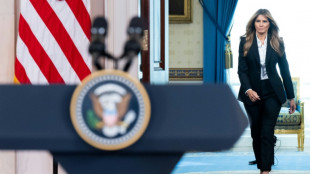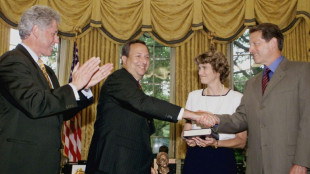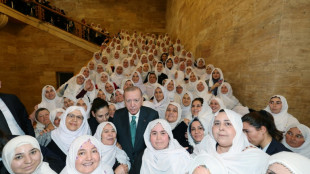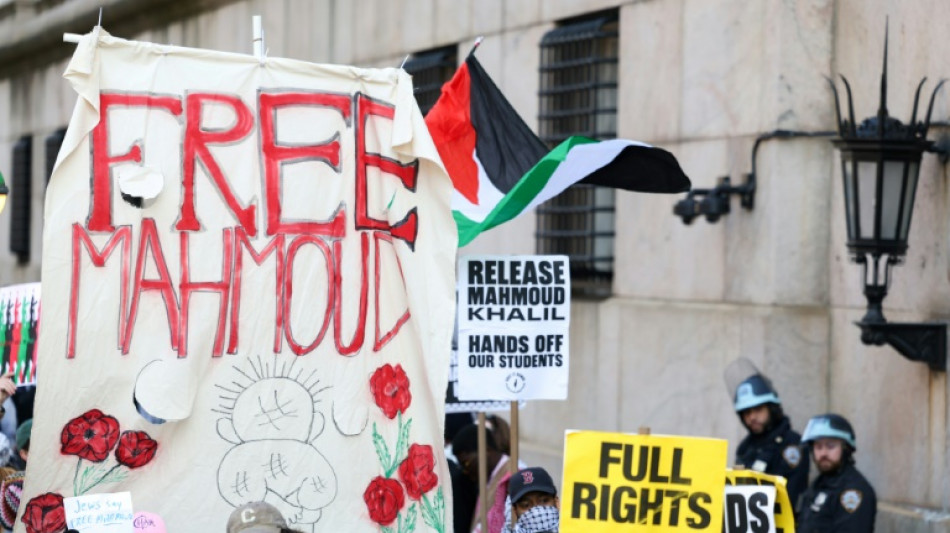
-
 Underdogs Wales could hurt Irish after Scotland display: Popham
Underdogs Wales could hurt Irish after Scotland display: Popham
-
Gilgeous-Alexander rules over Knicks again in Thunder win

-
 Hamilton reveals sequel in the works to blockbuster 'F1: The Movie'
Hamilton reveals sequel in the works to blockbuster 'F1: The Movie'
-
Alonso, Stroll fear 'permanent nerve damage' from vibrating Aston Martin

-
 China boosts military spending with eyes on US, Taiwan
China boosts military spending with eyes on US, Taiwan
-
Seoul leads rebound across Asian stocks, oil extends gains

-
 Tourism on hold as Middle East war casts uncertainty
Tourism on hold as Middle East war casts uncertainty
-
Bayern and Kane gambling with house money as Gladbach come to town

-
 Turkey invests in foreign legion to deliver LA Olympics gold
Turkey invests in foreign legion to deliver LA Olympics gold
-
Galthie's France blessed with unprecedented talent: Saint-Andre

-
 Voice coach to the stars says Aussie actors nail tricky accents
Voice coach to the stars says Aussie actors nail tricky accents
-
Rahm rejection of DP World Tour deal 'a shame' - McIlroy

-
 Israel keeps up Lebanon strikes as ground forces advance
Israel keeps up Lebanon strikes as ground forces advance
-
China prioritises energy and diplomacy over Iran support

-
 Canada PM Carney says can't rule out military participation in Iran war
Canada PM Carney says can't rule out military participation in Iran war
-
Verstappen says new Red Bull car gave him 'goosebumps'

-
 Swiss to vote on creating giant 'climate fund'
Swiss to vote on creating giant 'climate fund'
-
Google to open German centre for 'AI development'

-
 Winter Paralympics to start with icy blast as Ukraine lead ceremony boycott
Winter Paralympics to start with icy blast as Ukraine lead ceremony boycott
-
Sci-fi without AI: Oscar nominated 'Arco' director prefers human touch

-
 Ex-guerrillas battle low support in Colombia election
Ex-guerrillas battle low support in Colombia election
-
'She's coming back': Djokovic predicts Serena return

-
 Hamilton vows 'no holding back' in his 20th Formula One season
Hamilton vows 'no holding back' in his 20th Formula One season
-
Two-thirds of Cuba, including Havana, hit by blackout

-
 US sinks Iranian warship off Sri Lanka as war spreads
US sinks Iranian warship off Sri Lanka as war spreads
-
After oil, US moves to secure access to Venezuelan minerals

-
 Arteta hits back at Brighton criticism after Arsenal boost title bid
Arteta hits back at Brighton criticism after Arsenal boost title bid
-
Carrick says 'defeat hurts' after first loss as Man Utd boss

-
 Ecuador expels Cuba envoy, rest of mission
Ecuador expels Cuba envoy, rest of mission
-
Arsenal stretch lead at top of Premier League as Man City falter

-
 Title race not over vows Guardiola after Man City held by Forest
Title race not over vows Guardiola after Man City held by Forest
-
Rosenior hails 'world class' Joao Pedro after hat-trick crushes Villa

-
 Brazil ratifies EU-Mercosur trade deal
Brazil ratifies EU-Mercosur trade deal
-
Real Sociedad edge rivals Athletic to reach Copa del Rey final

-
 Chelsea boost top four push as Joao Pedro treble routs Villa
Chelsea boost top four push as Joao Pedro treble routs Villa
-
Leverkusen sink Hamburg to keep in touch with top four

-
 Love match: WTA No. 1 Sabalenka announces engagement
Love match: WTA No. 1 Sabalenka announces engagement
-
Man City falter as Premier League leaders Arsenal go seven points clear

-
 Man City title bid rocked by Forest draw
Man City title bid rocked by Forest draw
-
Defending champ Draper ready to ramp up return at Indian Wells

-
 Arsenal extend lead in title race after Saka sinks Brighton
Arsenal extend lead in title race after Saka sinks Brighton
-
US, European stocks rise as oil prices steady; Asian indexes tumble
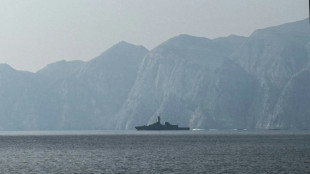
-
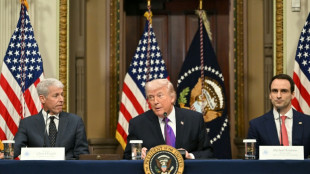 Trump rates Iran war as '15 out of 10'
Trump rates Iran war as '15 out of 10'
-
Nepal votes in key post-uprising polls
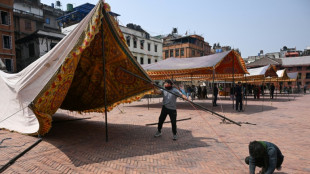
-
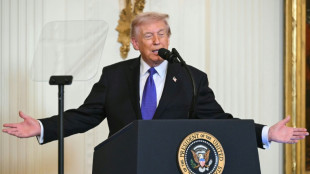 US Fed warns 'economic uncertainty' weighing on consumers
US Fed warns 'economic uncertainty' weighing on consumers
-
Florida family sues Google after AI chatbot allegedly coached suicide

-
 Alcaraz unbeaten run under threat from Sinner, Djokovic at Indian Wells
Alcaraz unbeaten run under threat from Sinner, Djokovic at Indian Wells
-
Iran's supreme leader gone, but opposition still at war with itself
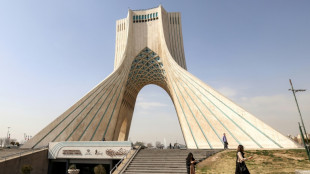
-
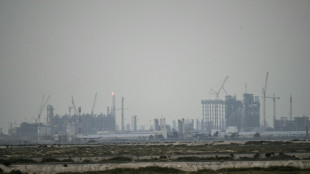 Mideast war rekindles European fears over soaring gas prices
Mideast war rekindles European fears over soaring gas prices
-
'Miracle to walk' says golfer after lift shaft fall


Trump treatment of Columbia puts US universities on edge
Hit by massive funding cuts and a crackdown on student protesters, Columbia University is under fire from US President Donald Trump, putting the world of higher education on tenterhooks.
The arrest of student activist Mahmoud Khalil has crystallized concerns over freedom of speech under the Republican leader's administration -- and fueled warnings that Trump is out to quell dissent.
Khalil, a US permanent resident with Palestinian roots, recently earned a graduate degree from the prestigious Ivy League school in New York.
But he was detained in early March by plainclothes immigration agents over his role in the student movement protesting Israel's war on Gaza.
Trump has vowed Khalil's detention is the first in a line of arrests to come.
Columbia's student movement has been at the vanguard of protests that have exposed deep rifts over the war.
Activists call them a show of support for the Palestinian people. Trump condemns them as anti-Semitic, and says they must end.
The president has cut $400 million in federal funding from Columbia -- including research grants and other contracts -- on the questionable grounds that the institution has not adequately protected Jewish students from harassment.
Experts say the move aims to send a message to other universities: fall in line or face the consequences.
"Columbia has been placed in an impossible position," Lynn Pasquerella, president of the American Association of Colleges and Universities, told AFP.
"We can be sure that the other 60 higher education institutions that have been targeted for a perceived failure to comply with federal mandates are paying close attention to Columbia's response."
- 'Critical moment' -
Columbia's interim president, Katrina Armstrong, acknowledged the "critical moment for higher education" in a recent statement.
US universities are still reeling from a furor over pro-Palestinian protests that has felled several institutions' presidents since the Gaza war began, including at Harvard, the University of Pennsylvania and Columbia itself.
"The stakes are high not only for Columbia, but for every college and university in this country," Armstrong said, vowing a commitment to "open dialogue and free debate" as well as "efforts to combat hate and discrimination on campus."
Beyond that cautious official position -- which has come under criticism from various sides -- Columbia is making moves.
Entry to campus is barricaded, though immigration officers have entered for surprise searches, and the university gave police the green light to remove pro-Palestinian activists last spring.
Last week, the private university announced a battery of disciplinary measures -- including suspensions, temporary degree revocations and expulsions -- aimed at student protesters who occupied a campus building last year.
Still, in a letter sent to Columbia last week, the Trump administration gave the university one week to agree to a series of drastic reforms if it wants to open negotiations to recover the $400 million.
The letter demands Columbia codify a definition of anti-Semitism that includes a focus on anti-Zionism, and insists the Middle Eastern, South Asian, and African Studies departments be put under "academic receivership."
That rare step puts an academic department under outside administrative oversight, and is generally only used to reset -- or axe -- a department in crisis.
- 'Existential threat' -
Pasquerella said Trump's moves put core principles of higher education at risk, seeking to control the curriculum and "impose a particular definition of anti-Semitism on the university by ostensibly conflating any pro-Palestinian sentiment and activity with unlawful activity."
The administration's demands "threaten to undermine the democratic purposes of higher education by impeding academic freedom," she said.
For Jameel Jaffer, who directs the free speech-focused Knight First Amendment Institute at Columbia, the White House's bid to control university policies poses an "existential threat to academic life itself."
The undertone of the letter is clear, he said: "It basically says, 'We'll destroy Columbia unless you destroy it first.'"
"The subjugation of universities to official power is a hallmark of autocracy. No one should be under any illusions about what's going on here," Jaffer told AFP.
Trump's pressure has also given new life to pro-Palestinian protests, which are again happening virtually every day throughout New York -- including a recent one at Trump Tower in Manhattan.
But that engagement in the streets is not undoing the damage already done at academic institutions across the nation, Pasquerella said.
"Many institutions are already engaging in anticipatory or preemptive compliance with requests by the current administration, even if they are not legally required, in order to avoid being targeted," she said.
"The real losers in all of this are the students."
G.Frei--VB

